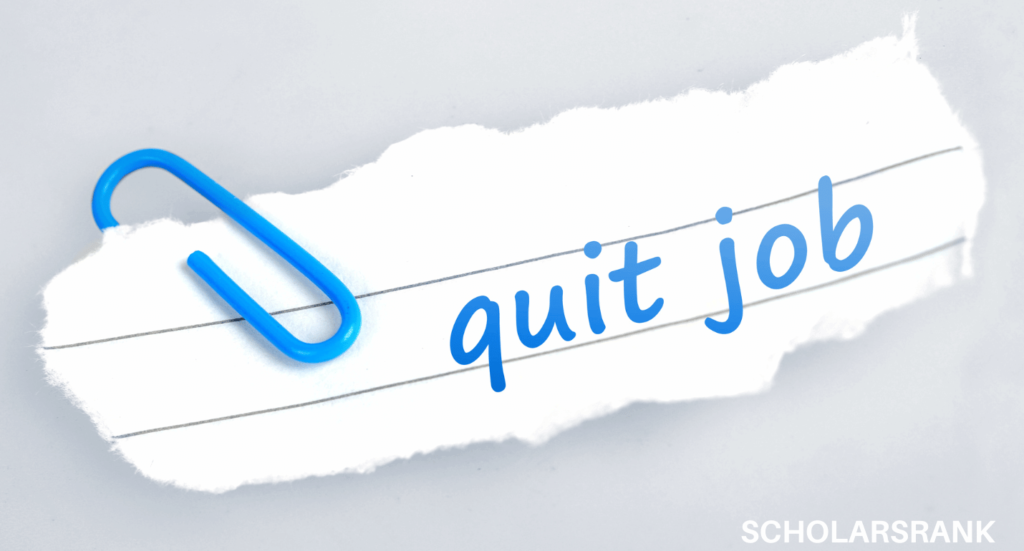Introduction
Have you ever had one of those “I quit my job and ruined my life” moments? It was most likely a dramatic movie scene.You resigned from your position because you anticipate happiness and nice things. That, however, did not turn out as expected.
Do you believe that quitting your work has ruined your life? We can assure you right away that persistence, careful planning, and setting priorities can help you find a solution.
Even if your choice feels like it was a mistake, realize that it was probably the right one. We’ll try to clarify the reasons people leave their professions in this post, and we’ll also offer some guidance for your particular circumstance. Keep on reading.
Motives for Quitting Your Job
You left your work a while ago, but you’re still second-guessing it because you feel like “I quit my job and ruined my life.”

It wouldn’t be a terrible idea to think back to the reasons you left your work to confirm whether your choice was the right one.
- You Leave Your Position To Pursue Your Dreams
We also reach deeper, much more fundamental, non-material motivations. Even though your former position may have been fantastic, you might have desired more from life. Maybe the motivational signs you see in the world that exhort us to pursue our aspirations inspired you. Do you recall hearing any motivational tales of people who gave up their careers to travel the world and post gorgeous photos on social media while getting paid to do so?
Or those who create a new coin and make their first million before turning 30? We don’t want to downplay anyone’s accomplishment, and we’re not suggesting those stories aren’t true, but things don’t always turn out that way in real life.
- The Toxic Atmosphere at Work
There is frequently a toxic environment among staff or in the relationship between employers and their staff in many workplaces. Particularly when incredibly aggressive conduct is present. You get the impression that everyone would trample on corpses to advance in such an environment.
- You Put In Extra Hours And Received Poor Pay.
These are undoubtedly some of the most prevalent and self-explanatory reasons for quitting. Unfortunately, we frequently feel that we deserve a larger pay since we work extra hours without getting rewarded for them. Everyone decides to leave such positions once they receive the first better offer and terms.
- You Were Depressed Because Of Your Former Job
If the aforementioned factors are in doubt, you can feel as worn out at the end of the workday as if you had just completed a marathon.
- Additionally, you are too indolent to perform anything at work.
- You were exhausted and lifeless at your last job.
- If you are miserable at work but are unable to quit, the situation is considerably worse.
Your typical day consisted of going to a 9 to 5 job that was a dead end and killing all your motivation, returning home at night, and then watching A movie, which was more of a snooze.
- Reasons Why You Left Your Job In Detail
Your decision to quit may also be influenced by some other personal factors.
- Let’s say your employment is fine right now, but you detest where you live and feel confined there.
- You were forced to leave your employment because you wanted to alter the environment.
- If your partner despises your job, it is another specific reason to resign. This might have resulted in disagreements and relationship damage until one day you decided to put your relationship ahead of your career and quit your job.
Reasons For Your Present Regret On “I Quit My Job And Ruined My Life”
Since things didn’t go as well as you had hoped, you now feel as though you have nothing left. Your biggest life-destroying error might even be to leave your work.

- You Gave Up Too Soon.
You might feel that you acted too quickly and without giving the situation enough thought. Such uncertainties are bound to surface after making a difficult choice.
- You Can’t Find a New Job
People who believe they will find employment fast after quitting frequently experience this. There is a substantial supply of employment available today, but it can be much harder than it seems to get the job you desire. Perhaps you anticipated finding a new job soon, but the process took a while.
Finding a new job is particularly difficult if you decide to completely alter your field. Look at the rivalry on LinkedIn, for example. They not only have flawless CVs, but they also have model-like professional photographs.
- You Lacked A Backup Strategy.
Without a backup plan, leaving a job could lead to unpleasant realities. You’ll likely start spending down your money and struggle to pay your bills. Due to how difficult and competitive the job market is, going through fruitless applications and interviews may cause you to second-guess your decision to leave your current position without first finding another one.
But you probably already knew that giving up would be difficult. In other words, even though they came out a little steeper, what you are feeling is what you expected.
- You’re Not Happy With Your Job Right Now.
Before or immediately after quitting your previous employment, you might have found a better-paying position. However, for a variety of reasons, you can come to feel frustrated with the new organization.
You can experience rudeness and a lack of context. You can think that your efforts are in vain. It’s also possible that you’re having trouble adjusting to your new environment and connecting with your new coworkers. Although these arguments are valid, you can be going through transitional woes.
- You Haven’t Established A New Career Or Job For Yourself.
Even though your new job is fantastic, it’s not the right fit for you.
Sadly, it was not what you had hoped it would be. You weren’t inside of it.
You quit your previous position, dislike your present one, and are likely wondering what is wrong with you. Examples of this include having fantastic work but having to commute a long distance from your family or home.
Or perhaps you’ve decided to work for yourself but you can’t tolerate the unpredictability and ongoing client search that come with it.
- At Your New Job, You Ran Into The Same Or Worse Issues.
You had hoped that this time would be different, but it wasn’t. Sadly, the same problems that plagued you in your old employment persisted at your new one as well. You are already aware of the poor working conditions, low pay, and tense managers. Your previous job does seem better today than it did before in comparison to the new one.
- You Miss Your Prior Position
If you left a career you enjoyed, it would be challenging to move into a new position. It could seem impossible to replace your old workplace and coworkers, which may make you consider applying for your old job back.
- Your Backup Scheme Fell Flat
You may be questioning your choice to leave because the plan you had for your next move didn’t materialize.
Should You Get Your Old Job Back?
Though it might not seem like it, having regrets is a wonderful chance to discover more about who you have become and what you want out of your job.
Although there is nothing wrong with making a boomerang movement back to your previous workplace, it’s crucial to keep in mind that the factors or actions that led to your departure might not have changed. Because that route is the most known, you might wish to turn around.
Before considering applying for your former work again, there are a few things you should think about. Before responding to these queries, it would be premature to state, “I quit my job and ruined my life.”
- When You Left, Did You Destroy Any Bridges?
Consider carefully your actions throughout your final days with the organization. You said you were quitting, why? How did the populace react?
There is no turning back if you acted unfavorably and aired your displeasure on your way out. It could be more difficult to easily transition back into the role if there are no solid relationships left.
Even in bad situations, I always advise people not to sever ties. You have the choice to take your former job back if you are gracious. Additionally, you never know where your colleagues will wind up. They might come in handy as references down the road.
- Why Did You Quit?
You departed for a cause, I’m sure. Maybe your squad and you didn’t get along. Will anything alter if that is the case after you return? Make sure you are not creating the same issue for yourself. On the other hand, your departure might have been motivated by money. Too frequently, people resign in favor of a job with a greater salary without taking into account any potential non-cash benefits.
Money is significant, yes. However, studies indicate that it has just a tenuous connection to job satisfaction. Close relationships, fulfilling employment, and the chance to advance can be far more valuable.
- Did You Add To Your Skill Set?
Why return to your previous position if you weren’t growing and learning there? The ideal motivation to accept a new chance is to broaden your horizons and develop new talents. With any luck, this will enable you to obtain a more important position and earn more money.
When you leave, specifically if you feel confined, you don’t want to return to a position that seems the same.
- How Did Your Boss Treat You?
More than just people’s lives are at risk in this situation. More than anybody else, your supervisor determines how much you develop by deciding to either give you challenging tasks or extra duties that advance your knowledge and expertise. Nothing compares to working for someone that supports you, puts money into your career, and allows you room to develop.
- Do You Think Going Back Would Be A Terrible Idea?
Say that someone has already applied for your position. Or you did cross a lot of bridges. perhaps you weren’t developing. Or perhaps your boss was poisonous. Whatever you do, avoid leaving your current position and hope to land your previous one again. Create a backup plan and follow it.
- Is Your Former Position Still Open?
If your prior job is no longer open, there may be no use in trying to get it. It’s possible that the company has hired a replacement for the position you vacated or that interviews are being held. Therefore, check to see if there is a work you may return to while you consider your options.
You can look through the company’s job ads and LinkedIn profile. Call former coworkers who are still employed there if you are still close.
- Do You Have Desperation?
You might be considering returning to your previous position because you don’t have many other possibilities. However, before making a snap judgment, you should calm down and consider your options. You did leave your work for a cause, after all. If those factors remain, it would be best for you to look for employment elsewhere.
- What is the Boomerang Policy of the Company?
Some businesses are hesitant to rehire former employees for a variety of reasons:
- The possibility that a former employee would resign suddenly once more makes hiring them a high-risk decision.
- They might be seeking to hire a more qualified candidate.
- The worker didn’t depart amicably.
Therefore, don’t assume that simply because you want to come back, your employer will rehire you. To make sure they still oppose recruiting boomerang workers, you can check with a few people.
What To Do If You Regret Quitting Your Former Job
You can reassess your stance and make better decisions by having regrets, as I already indicated.
You must recollect your motivations for leaving the position before declaring, “I quit my job and ruined my life.” You might still feel the same way about why you left, and you might not have the patience to put up with the workplace environment.
So what are you supposed to do regarding your disappointment?
- Accept Your Situation as It Is.
You might be able to deal with the remorse by accepting your existing circumstance. You’ll be able to look forward in this way, especially if going back to your previous position isn’t a good option.
- Plan Your Next Steps and Weigh Your Options
You can think more clearly after accepting your current circumstances. Keep in mind that, depending on your circumstances, everything is possible, including getting your former work back. When weighing your options, think about returning to your previous position or moving on to a new one.
- Think About Making Amends At Your New Job
If you’re having trouble adjusting to your new employment, you might be reconsidering your decision to leave. You might not get along with your new coworkers, feel uneasy in your new position, and have problems with the administration of the business.
Consider the potential that you might end up loving your new employment rather than exercising your right to immediate termination. Try to mingle more and get to know your new coworkers. Work on your management skills. Discuss any improvements you’d like to see with your boss.
What If Returning To Your Previous Position Is Not An Option?
Changing jobs may be your best option if you’re unhappy with your current position or didn’t have a backup plan before departing.
The wisest course of action is to move on to another business if:
- Your professional relationship with your former employers is no longer present.
- Your prior position has already been replaced at your former employer.
- Due to the reasons you left, you cannot go back to your old position.
- Your new job, which you got after quitting, is awful.
It turns out that the job market is promising and that there are plenty of positions available for you to fill in 2022. You’ll see that there are other possibilities and that you don’t have to say, “I quit my job and ruined my life.”
Having said that, you should prepare well before beginning your search for a new job.
- Properly quit your job.
- Learn new skills
- Make plans for your new role.
- Update your resume and get ready for the interview
Conclusion
Therefore, consider the fresh opportunities you might now explore rather than complain that you quit your job and ruined your life.
If you leave your work without a plan B, your professional life is not over. You may learn something new about yourself or acquire something better. Instead of tolerating a job that makes you unpleasant, you now can explore new opportunities and engage in activities you enjoy.
Do not believe that quitting your job has ruined your life. Never give up because of ego, status, or greed; instead, constantly consider the greater picture.
Whatever the circumstances, remember that there is a beacon at the end of the road. If you are diligent enough, you will recall the moment you left your work and made positive changes in your life.
Frequently Asked Questions (FAQs)
Is It Normal To Regret Quitting Your Job?
- According to a recent Joblist survey, 26% of workers who left their former jobs express regret over their choice. And considering that over 50 million Americans gave up in the last year, there are certainly a lot of regrets.
Why Is Quitting Preferable To Being Fired?
- Trying to negotiate a severance and a favorable recommendation are two benefits of leaving as opposed to getting fired. Quitting has drawbacks, such as giving up the ability to file for unemployment. If you believe that your employment is in jeopardy, you should begin searching for a new position just in case.
Is Burnout At Work A Valid Excuse For Quitting?
- Are job stress and burnout some of your main motivators? You’re not alone if you feel that your job has lost its appeal and that the long hours, stress, and anxiety are no longer worth it. Because of their emotional exhaustion and ongoing stress from demanding roles, people quit their jobs every day.
You can also read, “10 Ways On How To Ruin Your Boss Reputation“








